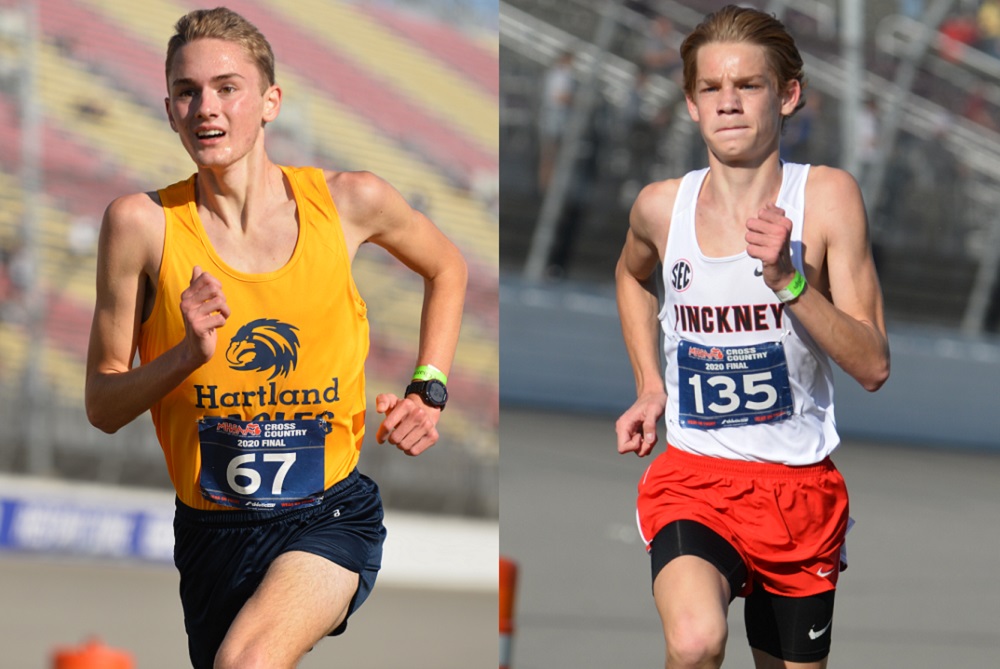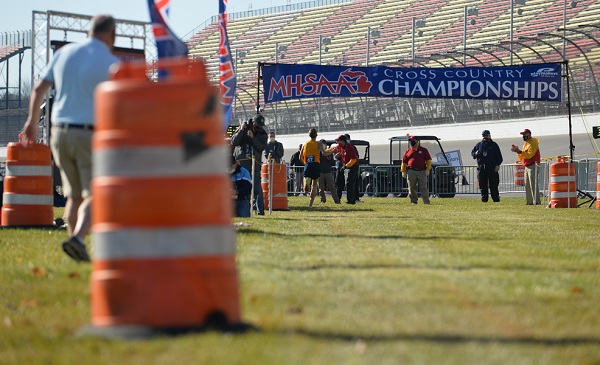
Livingston Pair Hough, Jarema, Primed for More Memorable Runs
By
Tim Robinson
Special for MHSAA.com
August 23, 2021
Hartland’s Riley Hough and Pinckney’s Caleb Jarema don’t see a lot of each other during their respective seasons, despite their schools being both located in Livingston County.
 Hartland is in Division 1 and Pinckney in Division 2, for starters, and they are in different conferences as well.
Hartland is in Division 1 and Pinckney in Division 2, for starters, and they are in different conferences as well.
They might have a rare chance to compete against each other in October’s Portage Invitational, provided Pinckney coach Jim Wicker can get his team into the Division 1 portion of the meet.
Otherwise Hough, who won the Lower Peninsula Division 1 Finals individual race last year, and Jarema, who was second last year in Division 2, may not face each other during this fall’s MHSAA season.
“We know each other pretty well,” Hough said. “We don’t talk too much, but when we’re racing we’re always talking a little bit.”
That is, until it’s time to go.
“Yes,” Hough said. “That’s when it gets silent and pretty serious.”
Both played soccer before turning to cross country. Hough got his start running while working on conditioning before playing soccer in the fourth and fifth grades.
“Then I did some local 5Ks, like the Howell Melon Run and the (Howell) Headless Horseman runs, and I saw I did pretty well for my age,” Hough said. “So did my parents. So we decided I could try cross country in the sixth grade, and it took off from there.”
Jarema took a different route. He played soccer and ran cross country his first two years of high school before giving up soccer before his junior year in 2020.
“I just started to enjoy running a lot more than soccer,” he explained, “and it became really hard to do both.”
It certainly worked out. Jarema improved from a 38th-place finish as a sophomore to second as a junior.
Both come from running families.
Jarema also was inspired by his older siblings. Brother Aaron is a senior at Ferris State University, while sister Courtney ran for a season at Oakland University.
“My brother was running for Pinckney, and I would be at his meets and it just seemed like a really fun environment,” Jarema said. “My brother was one of my role models, and I liked watching him run. I wanted to do the same thing he did, and then I ended up really enjoying it.”
Hough’s father, Jeff, competed at Corunna in high school, then went to Central Michigan University before finishing his career at William & Mary. He is an assistant coach at Hartland, and father and son talk running while driving to and from meets, among other things.
“He’s fortunate, or unfortunate, however you look at it, that he has to live with me,” Jeff says. “So we can discuss these things one-on-one. He’s very consistent at what he does, and it’s just a matter of improving from race to race. We’re down into small detail things now. He’s got the racing portion down now, We’re into the small, nitty-gritty things that can make a difference.”
 Both also know they are on everyone’s list this season. Hough's 14:49.62 last year was the second-fastest Finals time, all classes and divisions, since the championship race went to 5K in 1980. Jarema was one of only four runners to break 16 minutes in Division 2, and the other three runners graduated.
Both also know they are on everyone’s list this season. Hough's 14:49.62 last year was the second-fastest Finals time, all classes and divisions, since the championship race went to 5K in 1980. Jarema was one of only four runners to break 16 minutes in Division 2, and the other three runners graduated.
“There definitely is a mental pressure of having a target on your back,” Riley Hough said. “I’ve had it for a while and I know what it’s like. It’s hard. It helps push me along as well. It’s a little easier now that I’m used to it. Now that I’m a senior, I have these fast times and people are going to be gunning for me. It’s definitely going to be interesting.”
The times are the times, which give both confidence without veering into cockiness.
That also allows Jarema to admit, without any personal animosity, that he’s never beaten Hough.
“I feel I’m as good as anyone in the state,” Jarema said. “I mean, Riley is a phenomenal runner, and I may not be better than him. But I feel I can compete with him, for sure. So I feel there’s a target on my back, and yeah, I would say that it pushes me to be better off, for sure. I know there are kids who are working just as hard as me and are looking for the same type of breakout season.”
Both runners are part of teams that are close. Jarema talks about the importance of family, both his own and one created by his teammates. Hartland coach Matt Gutteridge, meanwhile, talks about Hough’s contributions on and off the race course.
“What I appreciate about Riley is how consistent he is,” Gutteridge said. “Whether it’s the training, or showing up and doing the little things, the leadership, I mean, he’s stepping up his game everywhere. He’s a consistent teammate and a consistent athlete. It’s fun to coach someone who’s that darn consistent.
“What he’s been able to do day in and day out still surprises me,” Gutteridge added. “He’s smart about his training. Even when he gets nicked up, he doesn’t shut it down. He pushes through it and is smart about it. That’s where I think he’s going to be successful, long-term. He really listens to his body, trusts his coaches, and the sky’s the limit for him.”
Pinckney coach Jim Wicker, a former Pirate who ran at Eastern Michigan, said he could see Jarema’s potential early.
“You could tell way back in the sixth grade he was going to be something special,” Wicker said. “He was always in the front, even if he was running against older kids. His talent and his competitive nature are just natural.
“He has high expectations and he really wants to be a Division I recruit,” Wicker continued. “He’s being recruited by some pretty good schools. I’m really proud of him. He’s doing a good job of staying grounded, keeping everything in perspective. He’s working hard, and I’m expecting big things from him.”
Hough and Jarema may have a few other chances to race each other this fall – potentially in non-MHSAA events after the Finals in November – and they’re both looking forward to possibly competing head-to-head.
“We definitely have conversations before the race, but once we get on the line it’s dead,” Jarema says of pre-race chit-chat. “He’s a super-nice kid, and I do really enjoy competing against him. You know, it’s more fun to compete against people who are friendly.”
PHOTOS: (Top) Hartland's Riley Hough, left, and Pinckney's Caleb Jarema sprint to the finish during last season's MHSAA Finals at Michigan International Speedway. (Middle) Hough crosses the line first in Division 1. (Click for more from RunMichigan.com.)

Century of School Sports: Cross Country Finals Among MHSAA's Longest-Running
By
Geoff Kimmerly
MHSAA.com senior editor
October 23, 2024
While we are celebrating multiple milestones this fall – the beginning of the MHSAA’s 100th anniversary, and our 50th Football Playoffs – we already can circle another notable date for the first season of the 2025-26 school year.
This time next fall, we’ll be on the cusp of our 30th Lower Peninsula Cross Country Finals at Michigan International Speedway, which has drawn an average of 9,332 fans to those four championship races since becoming their home in 1996.
Boys cross country actually was one of the first sports to have postseason events organized by the newly-formed MHSAA. Annual boys cross country championship races had been run since 1922 (according to L.L. Forsythe’s “Athletics in Michigan High Schools – The First Hundred Years”), and although the 1924 Open Class Final – won by Ann Arbor High School – was competed before the MHSAA’s official start date that December, it is counted on the list of official MHSAA championships. Cross country would be joined that inaugural school year by boys basketball, boys swimming & diving, boys tennis and boys track & field as the first sports with MHSAA-sponsored championship events. Girls cross country would be added in 1978 – the 10th girls sport introduced that decade – as the first steps were taken to provide opportunities for all high school athletes.
Several changes over the 55 years have led to a Michigan high school cross country competitive format that has remained mostly unchanged over the last four decades.
Initially, Lower Peninsula and Upper Peninsula teams ran Finals together until the break in championship meets for World War II during the 1942 and 1943 seasons. Since 1974, the Lower Peninsula has been separated into four Class (previously) or Division (currently) groupings for postseason competition, and the Upper Peninsula into three. Also, from 1971-96, two individual champions were awarded in each Lower Peninsula Class/Division – a winning runner from a race of team qualifiers, and another winning runner from a race of only those who had qualified for the Finals as individuals. The current field again includes all team and individual qualifiers in one race.
The distance of the championship race was two miles through 1969, then 2.5 miles in 1970 and 1971, and then three miles through the end of that decade. In 1980, the race became the standard five kilometers (or 3.1 miles) run today.
As noted above, the Lower Peninsula Finals moved to MIS in 1996, and annually a course is charted that begins on the stadium infield, continues into the surrounding property and concludes alongside the racetrack’s finishing stretch.
The Upper Peninsula Cross Country Finals are among the most picturesque of any MHSAA championship competitions, run in late October generally against a backdrop of reds, oranges, yellows and greens as tree leaves begin to change and fall. This past weekend, Upper Peninsula winners were celebrated at Pictured Rocks Golf Course in Munising. The Division 1 Boys Final featured the three fastest times run in the history of U.P. championship races.
Lower Peninsula teams will run their Regionals this Friday and Saturday, with Finals qualifiers convening at MIS again Nov. 2 while chased and cheered by an anticipated 10,000 fans in Brooklyn.
Previous "Century of School Sports" Spotlights
Oct. 15: State's Storytellers Share Fall Memories - Read
Oct. 8: Guided by 4 S's of Educational Athletics - Read
Sept. 25: Michigan Sends 10 to National Hall of Fame - Read
Sept. 25: MHSAA Record Books Filled with 1000s of Achievements - Read
Sept. 18: Why Does the MHSAA Have These Rules? - Read
Sept. 10: Special Medals, Patches to Commemorate Special Year - Read
Sept. 4: Fall to Finish with 50th Football Championships - Read
Aug. 28: Let the Celebration Begin - Read
PHOTOS (Clockwise from top left) The 1998 Lower Peninsula Class D Final begins at Michigan International Speedway. (2) Caro’s Yami Albrecht (542) holds onto the lead ahead of Bridgman’s Brian Njuguna during the 2016 LP Division 3 Final. (3) Eventual runner-up Leah Kiilunen of Calumet (9) leads a pack at the 2012 UP Division 1 race in Munising. (4) Runners begin the 1949 LP Class B Final at Washtenaw Country Club. (Photos of 1998 and 2016 Finals by RunMichigan.com; 2012 Finals photo by Paul Gerard; 1949 photo from MHSAA archives.)

